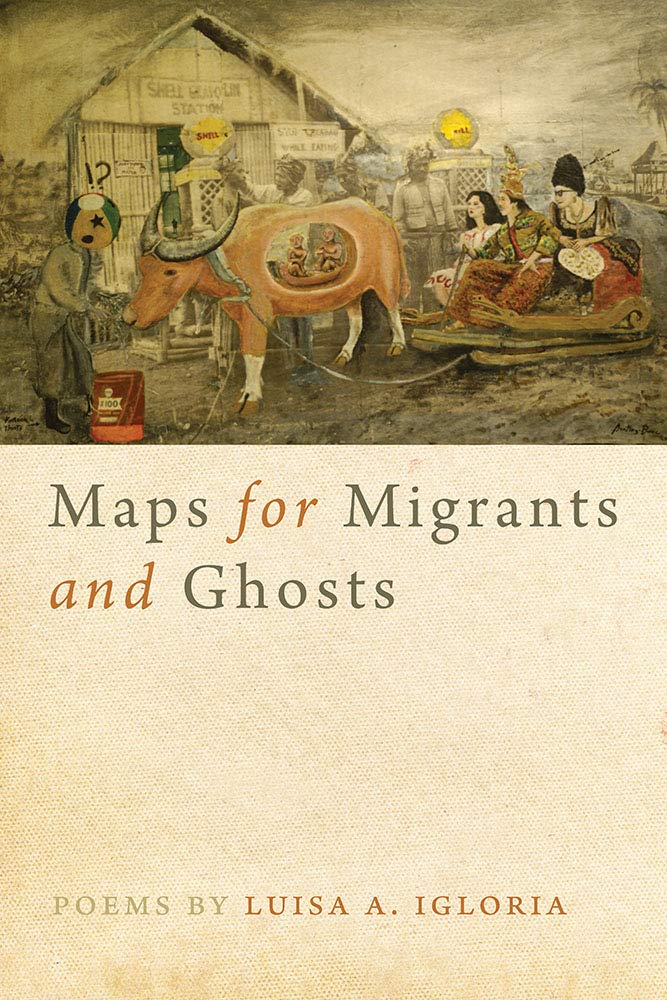Maps for Migrants and Ghosts
ORDER from SIU Press here
|
Language as key and map to places, people, and histories lost.
For immigrants and migrants, the wounds of colonization, displacement, and exile remain unhealed. Crossing oceans and generations, from her childhood home in Baguio City, the Philippines, to her immigrant home in Virginia, poet Luisa A. Igloria demonstrates how even our most personal and intimate experiences are linked to the larger collective histories that came before. In this poetry collection, Igloria brings together personal and family histories, ruminates on the waxing and waning of family fortunes, and reminds us how immigration necessitates and compels transformations. Simultaneously at home and displaced in two different worlds, the speaker lives in the past and the present, and the return to her origins is fraught with disappointment, familiarity, and alienation. Language serves as a key and a map to the places and people that have been lost. This collection folds memories, encounters, portraits, and vignettes, familiar and alien, into both an individual history and a shared collective history—a grandfather’s ghost stubbornly refusing to come in out of the rain, an elderly mother casually dropping YOLO into conversation, and the speaker’s abandonment of her childhood home for a second time. The poems in this collection spring out of a deep longing for place, for the past, for the selves we used to be before we traveled to where we are now, before we became who we are now. A stunning addition to the work of immigrant and migrant women poets on their diasporas, Maps for Migrants and Ghosts reveals a dream landscape at the edge of this world that is always moving, not moving, changing, and not changing. |
|
“‘It’s telling, the things / we return to,’ writes Luisa A. Igloria in this masterful new collection, where memory takes us on a journey that is full of music and wisdom. I opened this book on the poems about her mother and fell in love with this voice, one that has learned to be ‘completely alone, even among others,’ a voice that knows how to enter the dark and find music in it. This lyric record of Maps for Migrants and Ghosts is a journey both spiritual and personal, one that understands that at our most private we still live in history, yet finds, in the terrors of that history, a healing melody, a tune.”
— Ilya Kaminsky, author of Deaf Republic and Dancing in Odessa “In the face of injustice, these poems urge us to ‘say danger and defiance. / Not shoulder shrug, not fold over.’ And perhaps it also becomes the task of the poet to reconcile where she can; to try to sweeten the life, past or present; to be the ginger flower whose ‘torch burns with scent in the middle / of the garden. Not even the rain can put it out.’ These poems are adamantine—dazzling and diamond-strong. In language at once keen and lulling, muscular and sumptuous, Igloria gives us a book of losses as well as recuperations.” — Claire Wahmanholm, author of Wilder “Restlessly transiting between the past and the present, homeland and diasporic home, consciousness and conscience, Luisa Igloria is our poet of the lyric cusp. In poems that deconstruct memory into its parts—complex nostalgia, bittersweet love--Maps for Migrants and Ghosts is at once gorgeous and painful. I read this book with intensity, feeling, in the words of one poem, ‘ecstatic and furious.’” — Rick Barot, author of The Galleons “Urgent yet delicate, Luisa A. Igloria’s poetry excavates the rich material of the past. The poems fashion and refashion the self in flashes of dreams, apparitions of family long departed, and haunting regret. To cross the interstitial moments in these lyrical moments is to understand the losses one encounters when the world is leaving you behind. Yet in spite of the burdens catalogued in these remarkable poems, Igloria’s power is in returning us to a residence in beauty when the voices of crickets return us to their scintillate choruses.” — Oliver de la Paz, author of The Boy in the Labyrinth and Furious Lullaby |
